Understanding the Global Arena
International relations (IR) is a vast and dynamic field that delves into the intricate interactions between nations, organizations, and influential forces shaping our interconnected world. It explores the political, economic, social, and cultural dimensions that govern relations between states and non-state actors on a global scale. At its core, IR seeks to understand and analyze the complex factors influencing cooperation, conflict, and the ever-evolving nature of power in the international system.
Key Actors and Institutions
Nation-States: The primary players in international relations. Each nation-state possesses a unique set of interests, goals, and power dynamics guiding its foreign policy decisions and actions on the world stage.
International Organizations (IOs): Formal bodies established to facilitate cooperation and address global challenges. Prominent examples include the United Nations (UN), dedicated to maintaining peace and security, the World Trade Organization (WTO), regulating international trade, and regional organizations like the European Union (EU) or the African Union (AU).
Non-Governmental Organizations (NGOs): Civil society groups such as Amnesty International, Greenpeace, or the Red Cross play a significant role in advocating for specific causes, promoting human rights, or providing humanitarian aid.
Multinational Corporations (MNCs): Powerful economic entities with operations spanning multiple countries, these companies hold substantial influence over trade, investment, and global production networks.
Fundamental Concepts in International Relations
National Interest: A nation-state’s core values, aspirations, and priorities that drive its behavior in the global arena. National interests encompass objectives such as security, economic well-being, political influence, and the promotion of a state’s ideology or values.
Power: The ability to influence the actions of others to achieve desired outcomes. Power in IR is multifaceted, encompassing military might, economic strength, cultural influence, technological prowess, and diplomatic skill.
Diplomacy: The established practice of communication, negotiation, and relationship-building between states and other global actors. Diplomacy is an essential tool to resolve conflicts peacefully, foster cooperation, and pursue a nation-state’s interests.
Sovereignty: The principle underpinning a nation-state’s authority to govern its own territory and conduct its own affairs without external interference. Sovereignty is a foundational concept in international relations, but its limits are frequently contested in a globalized world.
Balance of Power: A concept suggesting that relative parity in power between states or alliances can contribute to stability in the international system. When one state or group of states accumulates excessive power, this theory posits that it encourages counterbalancing alliances to restore equilibrium.
International Law: A complex body of rules, treaties, and norms that regulate relations between states and other international actors. International law covers diverse areas such as human rights, the use of force, trade, and the environment.
Central Debates and Schools of Thought
IR offers a wide array of theoretical approaches and perspectives to unravel the nature of global politics. Some of the most prominent schools of thought include:
Realism: Emphasizes the pursuit of national interest and power in an anarchic international system where states must prioritize their own security. Realists view the global stage as a constant struggle for power and survival.
Liberalism: Emphasizes cooperation, interdependence, and the potential for international institutions to foster peace and prosperity. Liberals believe that economic ties, shared values, and international law can mitigate conflict and promote progress.
Constructivism: Focuses on the role of ideas, norms, and identities in shaping international relations. Constructivists argue that the way states perceive themselves and each other significantly influences their behavior and interactions.
Major Themes in International Relations
War and Peace: IR scholars and policymakers grapple with the enduring questions of why wars occur, how to prevent them, and how to build sustainable peace in the aftermath of conflict. This involves exploring strategies for arms control, conflict resolution, and international peacekeeping efforts.
International Political Economy: The intersection of politics and economics on the global stage, examining topics like trade relations, globalization, financial flows, development gaps, and the role of multinational corporations.
Global Challenges: Addressing transnational issues that no single state can solve alone. Climate change, terrorism, pandemics, human rights violations, forced migration, and cybersecurity demand international cooperation and innovative solutions.
Globalization: The increased interconnectedness and interdependence of the world through economic, cultural, and technological exchange. Globalization has far-reaching impacts on states, societies, and the distribution of power globally.
Human Rights and Development: Promoting universal human rights protection and fostering sustainable and equitable development worldwide. These efforts involve addressing poverty, inequality, and access to basic necessities like education and healthcare.
The Future of the International Order: Analysts debate the evolution of the global order, considering the rise of emerging powers, the changing role of established powers, and the potential for shifting alliances.
Conclusion
International relations is an endlessly fascinating and dynamic discipline that offers a lens to understand the pivotal events and trends shaping our world. As globalization accelerates and the world becomes increasingly interconnected, the significance of IR only grows. By grasping its core concepts, actors, and theories, we can better navigate the complexities of global politics and make informed decisions as citizens engaged in an ever-changing global society.


